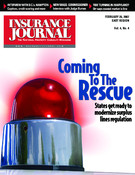By Rep. Paul Crowley & Patrick Shanley Jr.
Over the past several months, a group of legislators from the Rhode Island House of Representatives has been meeting in an effort to understand and respond to the recent drastic — and, in some instances, draconian — changes in homeowners insurance affecting homeowners near the coast. We have met with and listened to sources at all levels of the insurance industry as well as state regulators. We learned from several professors at the University of Rhode Island, including some who are world-renowned experts on hurricanes and catastrophic storms. Consider this an interim report as we have much more to learn and do. Our job is to ask the hard questions!
It’s much easier to blame the insurance companies, especially the smaller ones who conduct most of their business with customers in the Northeast. Is it the insurance companies’ fault? We suspect the answer is “yes and no.”
There is an abundance of evidence to suggest that historically, homeowners’ insurance has been under-priced, especially in comparison to automobile insurance products. Even so, homeowners’ insurance is historically the most profitable insurance product. Combined with logarithmical increases in property values — which have increased the potential costs to replace property damaged from a hurricane — there is reason to understand why prices have increased.
But those issues do not justify the astounding rate at which the increases have occurred, with some companies doubling their prices in the last year.
And these increases don’t account for some of the other requirements insurers have placed on homeowners. Included in this bag of misery to consumers are such things as deductibles as high as 5 percent for coastline dwellers and 2 percent for people living as much as 12 miles inland and requirements that homeowners reinforce parts of the home with battlements such as expensive storm shutters.
The insurance companies keep telling us that the firms that underwrite them are the bad guys. Called “reinsurance companies,” they are, for the most part, based outside the United States in Switzerland, England and even Bermuda. They are not regulated by the state and the federal government and cover trillions of dollars of risk worldwide.
We have yet to come to an understanding as to why, with the 50 states regulating insurance, no one has any power to regulate the re-insurers, who call the shots and are responsible for these increases.
Perhaps, from their post in some distant nation, they are unfamiliar with U.S. geography and think the Florida and Gulf coastlines somehow stretch to New England. That would explain why they continue to act as though homes in Rhode Island — where hurricanes never strike with the force they have in the Gulf area due to our distance from warm water — are facing the kind of risk the Gulf Coast experienced with Hurricane Katrina.
Our group will continue our investigation into the recent spike in homeowners’ insurance costs in Rhode Island, and we’re not going to accept double-talk from insurance companies or reinsurance companies. We want scientific proof of the risks that Rhode Island homes face from storms and hard evidence about the actual costs of insuring them against those costs.
We’re going to examine that evidence — and opposing ideas — closely to prevent insurers and re-insurers from stretching the science to suit themselves.
If we’re not satisfied with their answers, we’ll be looking at new ways to regulate them to prevent them from using storm risk as an excuse to line their CEOs’ pockets.
Members of the Rhode Island House, Rep. Paul W. Crowley (D-Dist. 75, Newport) and Rep. John Patrick Shanley Jr. (D-Dist. 35, South Kingstown) serve on ad hoc legislative committee formed to examine coastal homeowners insurance problems.
Was this article valuable?
Here are more articles you may enjoy.


 Insurance Issue Leaves Some Players Off World Baseball Classic Rosters
Insurance Issue Leaves Some Players Off World Baseball Classic Rosters  Florida’s Commercial Clearinghouse Bill Stirring Up Concerns for Brokers, Regulators
Florida’s Commercial Clearinghouse Bill Stirring Up Concerns for Brokers, Regulators  BMW Recalls Hundreds of Thousands of Cars Over Fire Risk
BMW Recalls Hundreds of Thousands of Cars Over Fire Risk  Insurify Starts App With ChatGPT to Allow Consumers to Shop for Insurance
Insurify Starts App With ChatGPT to Allow Consumers to Shop for Insurance 


